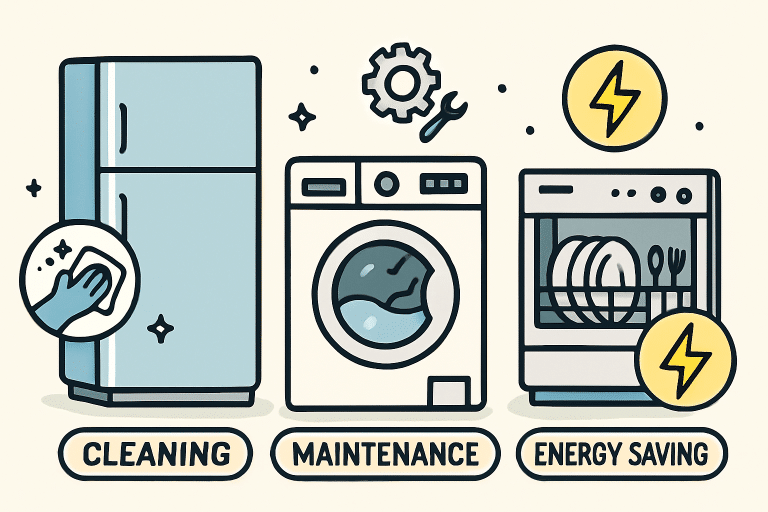Your home appliances are significant investments that play a crucial role in your daily comfort and convenience. Keeping them running efficiently for as long as possible not only saves you money on replacements and repairs but also supports a more sustainable lifestyle by reducing waste.
A few simple changes to your cleaning routine, usage habits, and overall care can work wonders for the longevity of your appliances. When specific parts need to be replaced, sourcing high-quality components from trusted suppliers like SamsungParts can help ensure continuous, reliable operation.
With the right maintenance strategies and energy-conscious habits, you can keep household essentials like refrigerators, dishwashers, and dryers operating at peak performance for years to come. Below, you’ll find a detailed guide on key practices to extend the life of your appliances—and how to spot when a replacement might actually save more in the long run.
Regular Cleaning and Maintenance
Routine cleaning is your first line of defense against declining appliance performance. Refrigerators work hardest when dust accumulates on their condenser coils, often located on the back or beneath the appliance. Cleaning these coils every six months prevents the motor from overworking and significantly reduces the risk of premature failure.
The same principle applies to dryers—frequent cleaning of the lint filter and exhaust duct enhances both efficiency and safety, reducing the risk of lint fires. Studies show that well-maintained appliances use less energy and experience fewer breakdowns. Consumer Reports provides an excellent list of basic maintenance chores for standard appliances.
Specific Cleaning Tips
- Dishwashers: Wipe filters weekly, clean spray arms, and run a vinegar cycle monthly.
- Ovens: Use the self-cleaning feature, but wipe away food debris regularly to prevent excessive smoke and odor.
- Washing Machines: Run a cleaning cycle with hot water and vinegar each month, and leave the door open to prevent mold growth.
Proper Usage Habits
Extending the lifespan of your appliances isn’t just about cleaning—it’s also about using them wisely. Overloading your washing machine or dishwasher can put unnecessary strain on motors and cause uneven cleaning or spinning.
Always stick to the manufacturer’s recommended load size, and avoid stuffing items tightly. For dishwashers, scrape food off plates but avoid pre-washing, as most modern models are designed to handle light residue.
Additionally, let appliances complete their full cycles. Interrupting or repeatedly starting and stopping them increases mechanical wear, especially on pumps and motors. Treat these systems as the precision machines they are—gentle, mindful operation yields the best results.

Energy-Efficient Practices
Adopting energy-saving habits can add years to your appliance’s service life while lowering utility costs. For instance, cold-water washes protect your clothes and consume up to 90% less energy in washing machines. In dryers, use the moisture sensor to automatically stop cycles when clothes are dry, and always spin laundry at the highest safe speed in the washer first to reduce dryer run-time.
According to the U.S. Department of Energy’s guide, understanding and estimating your appliance and home electronic energy use can help you make smarter decisions to improve efficiency and reduce waste.
Small adjustments, such as unplugging idle devices or turning off lights when not in use, can further reduce your energy footprint. Over time, these mindful practices not only cut costs but also contribute to a more sustainable household.
Optimizing Appliance Use
- Wait until you have full loads before running washing machines and dishwashers.
- Unplug small appliances when not in use, or use a smart power strip to cut energy vampire loads.
- Use refrigerator settings that match the appliance’s actual needs; avoid setting temperatures colder than necessary.
Protecting Appliances from Power Surges
Power surges, often caused by lightning strikes or grid switching, can damage or even destroy sensitive electronic components. Plug computers, entertainment systems, and smart refrigerators into high-quality surge protectors. For major household appliances, consider a whole-house surge protection system installed by a professional electrician. During thunderstorms, unplug small appliances to minimize risk.
It’s essential to replace surge protectors every few years, as they lose effectiveness over time. Most have indicator lights showing when protection is compromised. Regularly checking these indicators could help prevent costly damage to your appliance.
Upgrading When Necessary
Even the best maintenance cannot reverse the effects of aging technology. When your fridge, washer, or oven begins requiring frequent repairs, or your energy bills are creeping up despite attentive care, it may be time to upgrade. Newer models often come with advanced features for energy efficiency, enhanced performance, and safety.
For example, modern refrigerators use improved insulation and advanced compressors to cool more uniformly and consume less power overall.
Professional Maintenance Checks
Annual or biennial inspections by certified technicians are invaluable, especially for complex appliances such as central air systems, water heaters, or built-in ovens.
These experts can spot potential failures—such as worn gaskets, leaking hoses, or failing bearings—before they lead to more severe, more expensive breakdowns. Services often include deep cleaning of components most homeowners overlook, such as AC coils and washing machine drains.
Keeping a maintenance log with the date and results of each check-up helps you track performance and supports warranty claims should anything go wrong. Some manufacturers even require professional maintenance in order to keep warranties valid, so check your documentation and schedule service as recommended.
Conclusion
Long-lasting appliances start with attentive care. By establishing regular cleaning routines, adopting smart use habits, implementing energy-saving strategies, protecting against power surges, staying open to timely upgrades, and scheduling professional maintenance, you can maximize your investment and minimize environmental impact.
Thoughtful stewardship of your household essentials will extend both their lifespan and reliability for years to come.





































